NIL
New Texas NIL bill passes House after lengthy debate
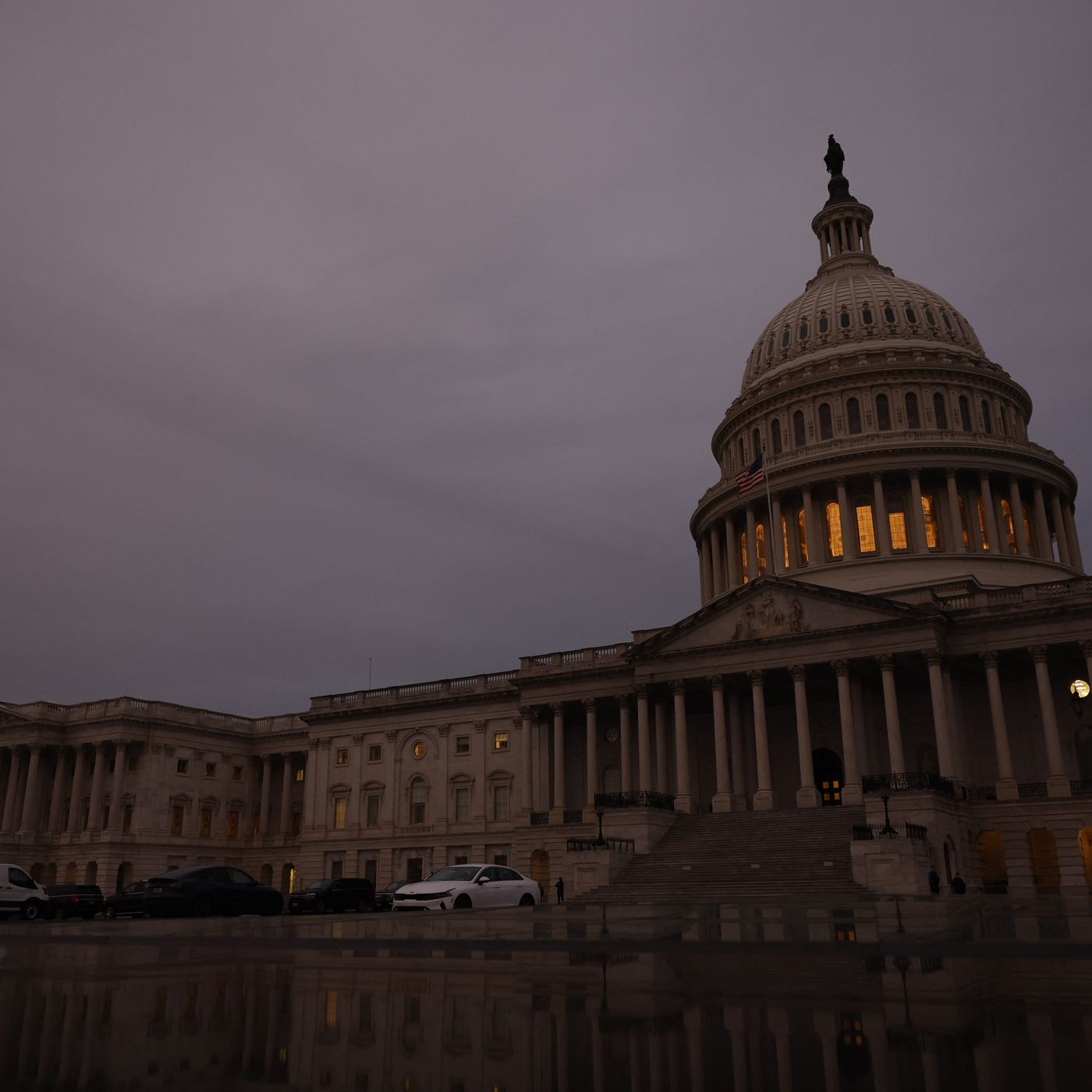
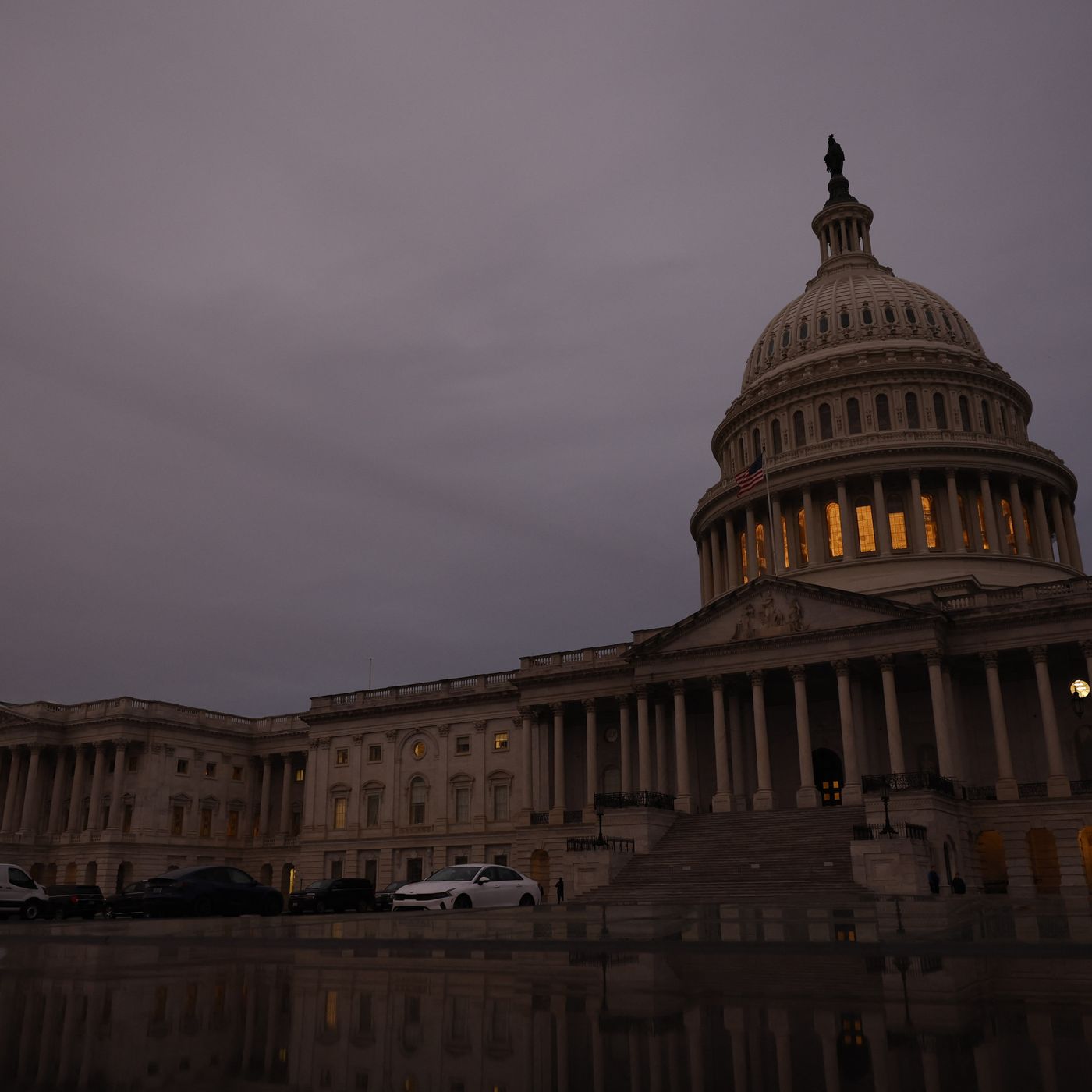
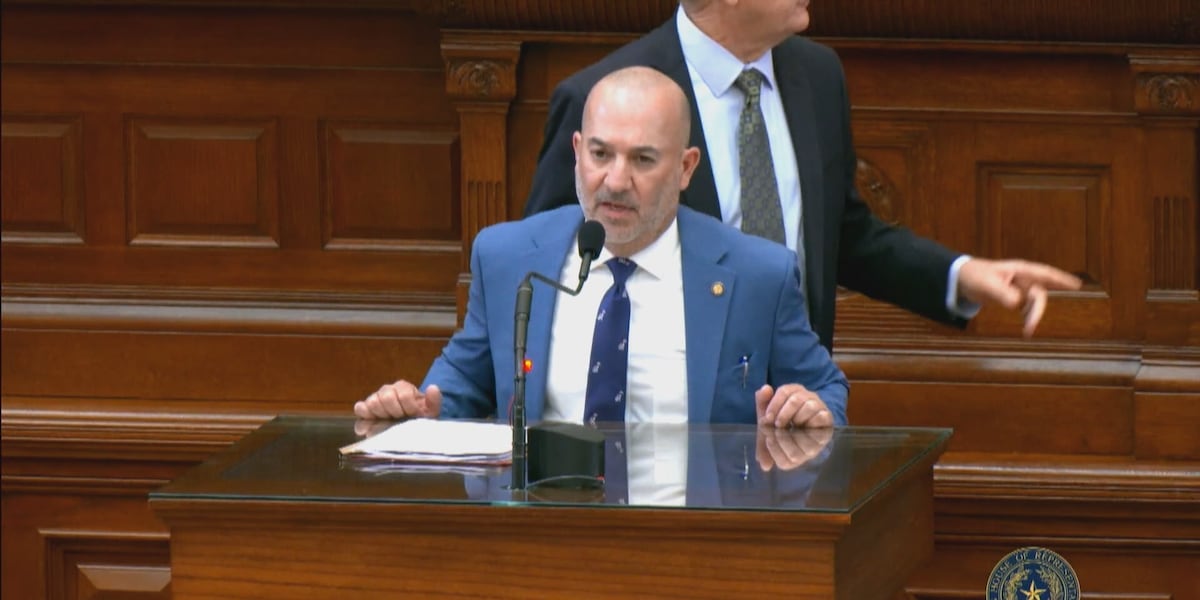
(KBTX) – Texas Rep. Mitch Little (R-District 65) bounced from one microphone to another on the House floor Monday, taking the lead in the resistance of a bill that supporters said would make college athletics in the state of Texas noncompetitive.
“I don’t think there is a way for us to close Pandora’s Box,” Little said on the House floor. “My concern is that the state of Texas and the legislature not open Pandora’s Box even farther.”
House Bill 126 ultimately passed the House vote 109-35, moving a new legislation name, image, and likeness (NIL) compensation for Texas college athletes one step closer to law. It would be the third iteration of NIL legislation to pass through the Texas legislature, the previous two with little turbulence. Monday, the debate over the bill lasted nearly an hour.
This bill, authored by Rep. Carl Tepper (R-District 84) widens existing NIL legislation so that athletes to be paid NIL compensation directly from their universities, while they are performing team-sanctioned events or to be used as inducement for enrollment at a school. It also contains a clause that allows new NCAA rules or court orders to supersede the state law, circumventing the need to update NIL law every two years.
With a settlement set to be approved in the House v. NCAA antitrust case in the coming weeks, the state was in need of the new language in the bill to comply. As it currently reads, the House settlement provides $2.6 billion in back payments for athletes who missed out on NIL from 2016 to the legalization of the payments in 2021. More important to this bill, the settlement allows universities to share revenue for the use of the athletes NIL in television broadcasts of games, among other things, which violates the current law in the state.
“We will be killing college football in Texas if we do not pass this bill,” Rep. Tepper said in response to a question from West Texas Rep. Stan Lambert (R-District 71).
NIL compensation was first codified in Texas on July 1, 2021, along with many other states around the country. It wasn’t until after several states proposed NIL laws that the NCAA relented and legalized the compensation across the organization. In the absence of any federal law regarding NIL compensation, NIL legislation has become a competition between states to create laws that are most inciting to the nation’s top recruits.
However, it’s this NIL arms race, along with a multitude of court cases, which Rep. Little described as “Pandora’s Box.”
Rep. Little’s most pressing arguments to block passage of the bill, both in questioning and speaking, is an athlete’s employee status and the rights of athletes to seek recourse of universities renege on NIL contracts.
“The university enters into an NIL contract with a student athlete, says ‘we’re going to pay you $4 million to come and play college football here,‘” Rep. Little said during debate. “And then they get on campus and the university decides, ‘you stink. We’re not going to pay you the rest of this NIL contract.’ What am I supposed to tell that student athlete concerning his ability to collect against a university that’s subject to sovereign immunity? Should I just tell him, ‘too bad?‘”
As state agencies, Texas public universities have immunity from suit, including with contracts, unless waived by the legislature. Rep. Tony Tinderholt (R-District 94) asked if there could be an amendment to the bill that waves sovereign immunity, to which Rep. Tepper declined.
“Sovereign immunity is a larger issue than this bill and so, right now, I would not accept any amendments,” announced Rep. Tepper.
Rep. Rafael Anchia (D-District 103) countered the employee argument by saying that was a question for a different day and a different bill.
“That is a fair argument,” Rep. Anchia reasoned. “However, I think that we can deal with that fact pattern and deal with the other laws that come to bear- as you suggested in your back and forth- outside of this bill. We don’t need to do it here.”
Finally, Rep. Jolanda Jones, a former All-American track and field athlete at the University of Houston, issued her argument against predatory deals made with athletes.
“Even the NIL athletes– which I will respectfully submit to you when I’m coming out of high school, deciding if I’m going to a college– I don’t have the best lawyers reviewing stuff,” she said. “I just don’t. The university has the best… Let me be clear, I picked the students over the universities 1,000 times out of 1,000. The universities have boosters, and they have money and these little bitty old athletes, they don’t have that. It’s unequal bargaining power, and let me be clear, we should have never been amateur. There was no reason I should have been starving when I was in college and having to sneak to work. But this [bill] is not the right answer.”
Both Brazos Valley representatives Paul Dyson and Trey Wharton voted in favor of the bill.
In the coming days, the bill will need to pass a Senate committee, then the Senate at large before making its way to the Governor’s desk to become law.
“This is a cleanup bill,” Rep. Tepper added in closing. “This is in response to a court settlement that’s going to come down and be finalized within seven days to 10 days, apparently. There’s no state funds involved. These are athletic departments. This is Texas. We believe in our student-athletes. We believe in football and, frankly, they deserve to get paid. This is what this bill does.”
Copyright 2025 KBTX. All rights reserved.
NIL
Wall Street Journal Article on NIL and Phillip Bell

Article is about Phillip Bells High School experience and being shopped to different schools and 7 x 7 teams. Really sad situation.
A few quotes:
“Bell’s mother, who abused drugs, shopped him from school to school, demanding up to $72,000 a year, according to court filings, public records and interviews with relatives and others who knew the family. He also joined a club team that paid thousands of dollars a weekend.’
On his visit to OSU: “The hotel room where Bell’s mother and stepfather were staying was “trashed,” leaving an OSU coach with a bill for broken furniture, his high-school coach later told relatives. A Buckeyes coach subsequently informed Bell’s mother that the team wanted her son, but the “entourage” wasn’t welcome in Columbus, the high-school coach said.
OSU declined to comment.
Before they left Ohio, Barnes’ blood sugar spiked to life-threatening levels, she suffered a heart attack and was hospitalized for several days, according to public records.”
Hoping that with support from OSU that he can break the cycle and achieve great things!
This link is behind a paywall: https://www.wsj.com/us-news/football-high-school-nil-phillip-bell-81270bdf?mod=hp_lead_pos7
Definitely worth a read – there is definitely a downside to the money flowing to these athletes. Kinda makes me wonder about the Legend Bey situation.
NIL
Georgia sues Missouri edge rusher Damon Wilson for nearly $400K over NIL contract he signed with Bulldogs
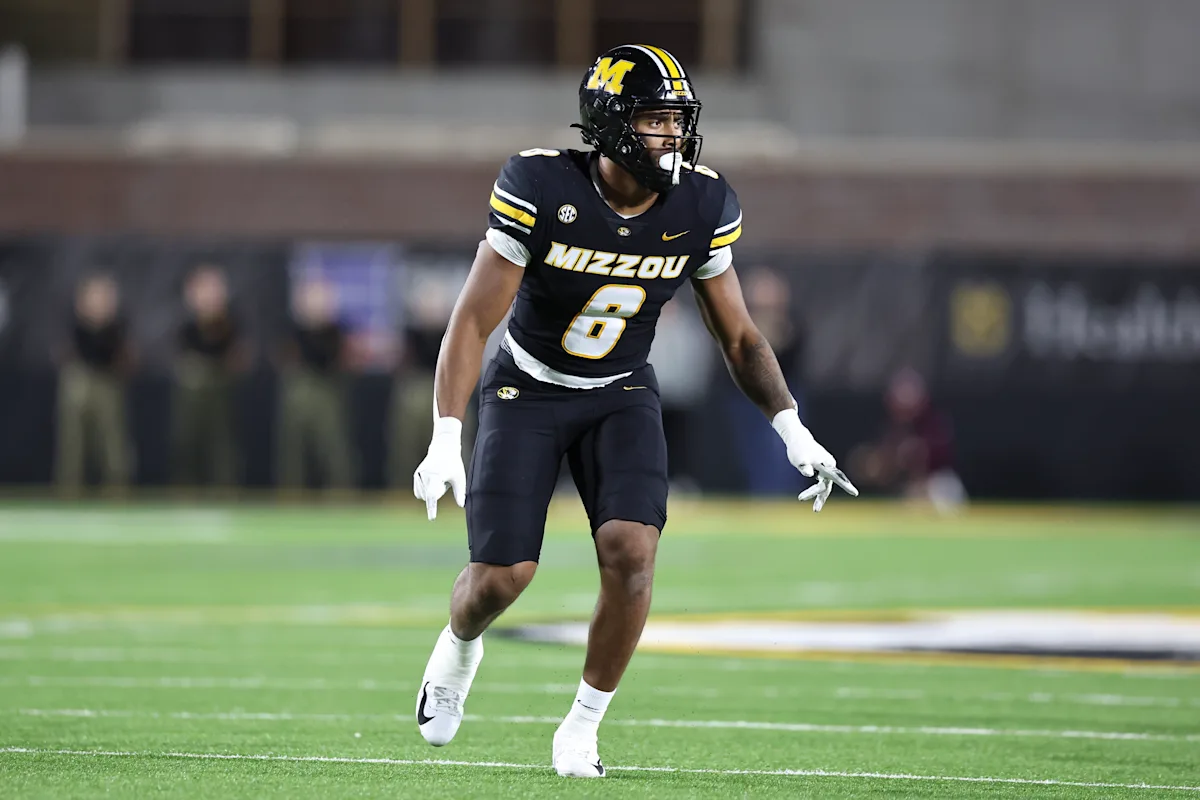
Georgia is attempting to get edge rusher Damon Wilson to pony up after his transfer to Missouri.
The school’s athletic association has filed a lawsuit against Wilson saying he owes $390,000 from the NIL contract he signed with the school’s collective in December 2024 ahead of Georgia’s College Football Playoff loss to Notre Dame. Wilson transferred after the 2024 season to Missouri and received one payment of $30,000.
Advertisement
Wilson, a junior, led Missouri with nine sacks and 9.5 tackles for loss this season. He had three sacks and 5.5 tackles for loss as a sophomore for the Bulldogs in 2024.
Georgia is claiming Wilson owes the balance of the base pay the contract stipulated he’d be paid via a liquidated damages claim. According to ESPN, Wilson’s deal with Classic City Collective was for $500,000 spread out over 14 monthly payments with two post-transfer portal bonuses of $40,000 and that he’d owe what was still set to be paid out to him if he left the team.
From ESPN:
“When the University of Georgia Athletic Association enters binding agreements with student-athletes, we honor our commitments and expect student-athletes to do the same,” athletics spokesperson Steven Drummond said in a statement to ESPN.
Georgia is not the first school to file a suit over NIL payments to a player who transferred. But the hard-line tactic is noteworthy, and may ultimately not work out in Georgia’s favor.
Advertisement
Schools typically do not ask coaches to pay out the balance of their contracts when leaving for another job. For example, Lane Kiffin did not have to pay Ole Miss what the school was scheduled to pay him over the rest of his deal with the school when he left for LSU. Instead, LSU paid Ole Miss $3 million for Kiffin to get out of his contract.
That situation happens all the time when coaches leave for new jobs. Their buyouts to get out of their contracts are far smaller than the buyouts schools owe when a coach is fired without cause.
And coaches are employees. Schools have long resisted that players be classified as employees and continue to do so even as the revenue-sharing era begins. The NCAA and its member schools have long clung to amateurism and that antiquated idea is why it took so long for players to get paid in the first place.
NIL
Georgia seeks $390K in NIL contract damages from Missouri football DE
Dec. 5, 2025, 3:22 p.m. CT

Georgia athletics is taking Missouri football defensive end Damon Wilson II to court in a novel, nearly first-of-its-kind case over an NIL contract dispute.
The news was first reported by ESPN’s Dan Wilson on Friday, Dec. 5. The Tribune confirmed the news through a university source and court documents filed in Georgia by the Bulldogs.
UGA is attempting to take Wilson into arbitration and is seeking $390,000 in liquidated damages from the star edge rusher, who transferred to the Tigers in January 2025, over what the university views as an unfulfilled contract in Athens. The lawsuit is not against the University of Missouri, only Wilson.
According to the ESPN report, Georgia is arguing that Wilson signed a contract — a common practice in the NIL era — with what was then UGA’s main NIL and marketing arm, Classic City Collective, in December 2024.
That collective has since shut down, as UGA has partnered with Learfield to negotiate and facilitate NIL deals in the revenue-sharing era.
The report, citing documents attached to UGA’s legal filings, show that Wilson signed a 14-month deal worth $500,000 with the Bulldogs. He was set to earn monthly payments of $30,000 through the end of the contract, as well as two $40,000 bonus payments.
Before announcing his intention to transfer in January, he reportedly was paid $30,000.
The contract states that if Wilson left the team or transferred, which he ended up doing by transferring to Mizzou, then he would owe the collective issuing the payments a lump sum equal to the amount remaining on his deal.
The bonus payments seemingly were not included, which brings that total to the $390,000 that Georgia is now seeking in court.
Wilson, per the report, was only paid a fraction of that sum, but the university is arguing that he owes the full amount in damages. It’s unclear why Georgia is arguing it is owed the full amount in liquidated damages.
The Tribune has reached out to a Georgia athletics spokesperson for comment. At the time of publishing, UGA had not responded to the request for a statement.
According to documents viewed by the Tribune through the Georgia courts records system, UGA filed an “application to compel arbitration” on Oct. 17 in the Clarke County Superior Court, which includes Athens and the University of Georgia. Wilson was served with a summons to appear in court, according to documents, on Nov. 19, three days before the Tigers faced Oklahoma.
A similar case occurred at Arkansas last spring, when quarterback Madden Iamaleava transferred out of Fayetteville after spring camp. It’s unclear whether or not that case has been resolved.
Wilson spent his freshman and sophomore seasons at Georgia. He transferred to Mizzou ahead of spring camp in 2025 and has emerged as one of the top pass rushers in the SEC.
Per Pro Football Focus, Wilson generated 49 pressures on opposing quarterbacks this season, which was the second-most in the SEC behind only Colin Simmons at Texas. He’s listed at 6 foot 4, 250 pounds and could declare for the 2026 NFL Draft, where he would likely be a Day 1 or 2 pick.

The lawsuit raises a contentious point.
By suing Wilson for allegedly not fulfilling the terms of his contract, the school could be treading close to arguing that Wilson was paid to play. That’s not how NIL deals currently work. The deals and their payments are typically for an athletes’ likeness for brand deals and marketing. Think of it as advertising money, not salaries.
There’s a reason that’s the case. By paying players for play, there’s an argument that they are university employees. University and athletic department leaders are widely against making that distinction, because it would disrupt the amateurism model in place for college athletics.
Wilson’s contract likely includes “liquidated damages” language, which are intended to stop players from transferring.
Missouri currently has multiple players on two-year contracts. Part of that is in the hope that they do not move on after one season.
If Georgia’s arbitration case against Wilson is successful, that would be a groundbreaking ruling in college athletics that could give more weight to liquidated damages clauses in athlete contracts.
NIL
Fired $15.8 million college football coach blames QB’s performance for his dismissal
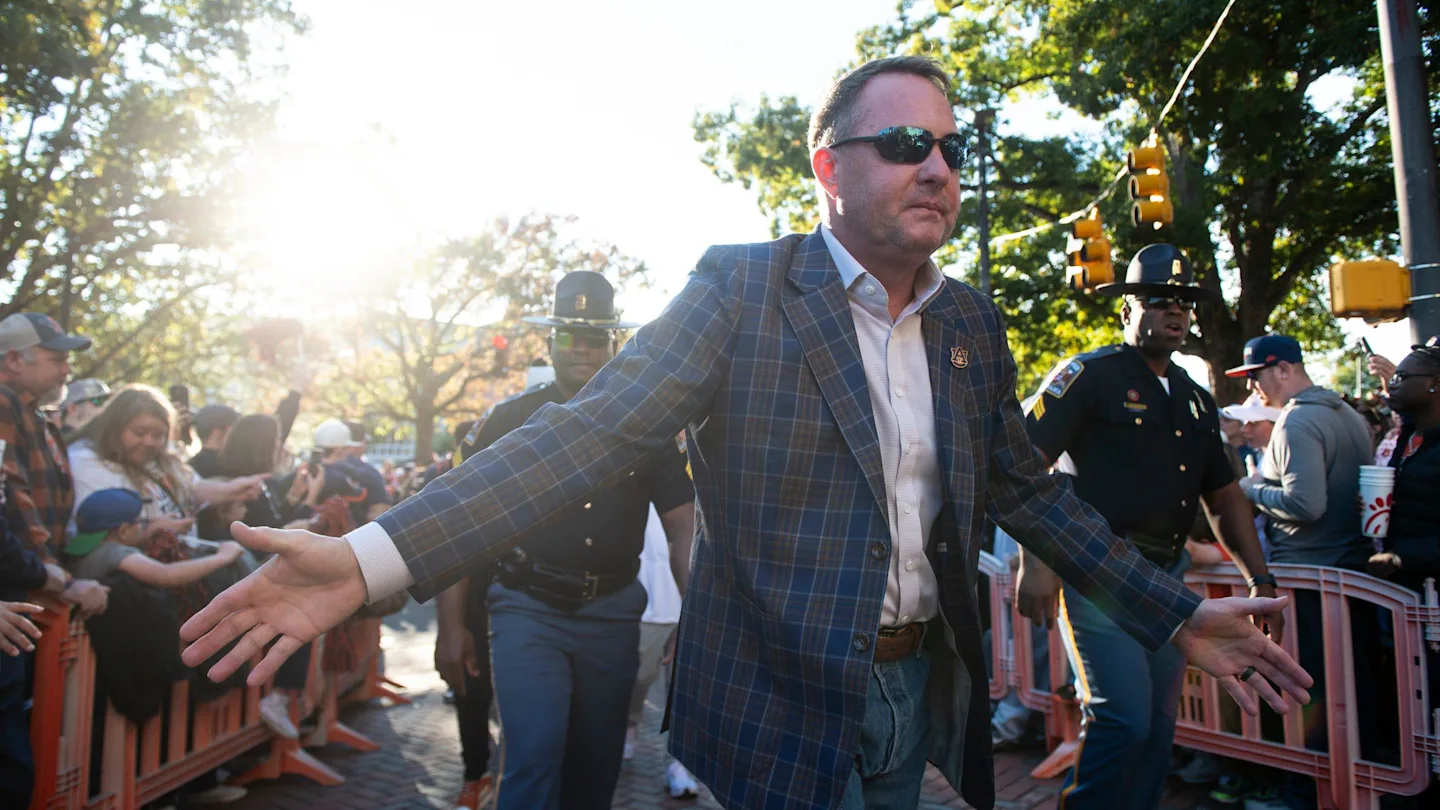
Fired Auburn football coach Hugh Freeze isn’t going out quietly.
Freeze was outspoken in the weeks before his dismissal, saying he and his staff were still the right fit to lead Auburn into the future, despite going 15-19 over two-plus losing seasons. Auburn athletic director John Cohen disagreed, firing Freeze on Nov. 2, taking on his $15.8 million buyout, and hiring South Florida head coach Alex Golesh last week.
Despite that nice payday on his way out, Freeze is still venting about his dismissal and blames quarterback Jackson Arnold for why he’s no longer Auburn’s head coach.
During an interview this week with AuburnSports’ Justin Hokanson, Freeze said, “Certainly, it didn’t work out to the level that he or I both expected for him and our team. And that’s why I’m sitting here.”
Freeze recruited Arnold out of the transfer portal from Oklahoma, where he passed for 1,421 yards, 12 touchdowns and three interceptions and rushed for 444 yards and three TDs as the Sooners’ starter in 2024. It seemed to be a mutual parting of the ways between Arnold and Oklahoma, which brought in the highly coveted Washington State transfer, John Mateer, at quarterback.
Arnold, who was a five-star prospect and the No. 4-ranked QB recruit in the 2023 class by 247Sports, looked for a fresh start as a junior at Auburn, but it was more of the same for him this fall as he passed for just 1,309 yards, 6 TDs and 2 INTs with 311 rushing yards and 8 TDs before being benched Oct. 25 vs. Arkansas after throwing an interception that was returned 89 yards for a touchdown.
Ashton Daniels, a senior and transfer from Stanford, took over and led Auburn back from an 11-point halftime deficit to a 33-24 win over the Razorbacks and finished the season as the starter.
Freeze tempered his comments on Arnold a bit, saying, “Let’s be clear, this is not a beat-up Jackson deal. It’s never always the quarterback. There are other factors. I mean, he missed a touchdown throw here at Oklahoma to a wide-open Cam Coleman.
“Those plays you’ve got to make to win games. And he would say that too. And there’s also the Missouri game, where we have what, eight drops? Then there’s moments in the Georgia second half where he misses open guys, or the protection is not great, so it’s a combination of all those things.”
Maybe it’s also partly the coaching. Freeze was given a six-year, $49-million contract at Auburn after having previous success at Ole Miss (on the field, at least) and Liberty, but he went 6-7 and 5-7 in his first two seasons before starting 4-5 this year and getting fired. He was 6-16 in SEC play during his tenure.
NIL
Michigan State Just Entered The College Football Arms Race With A Bang
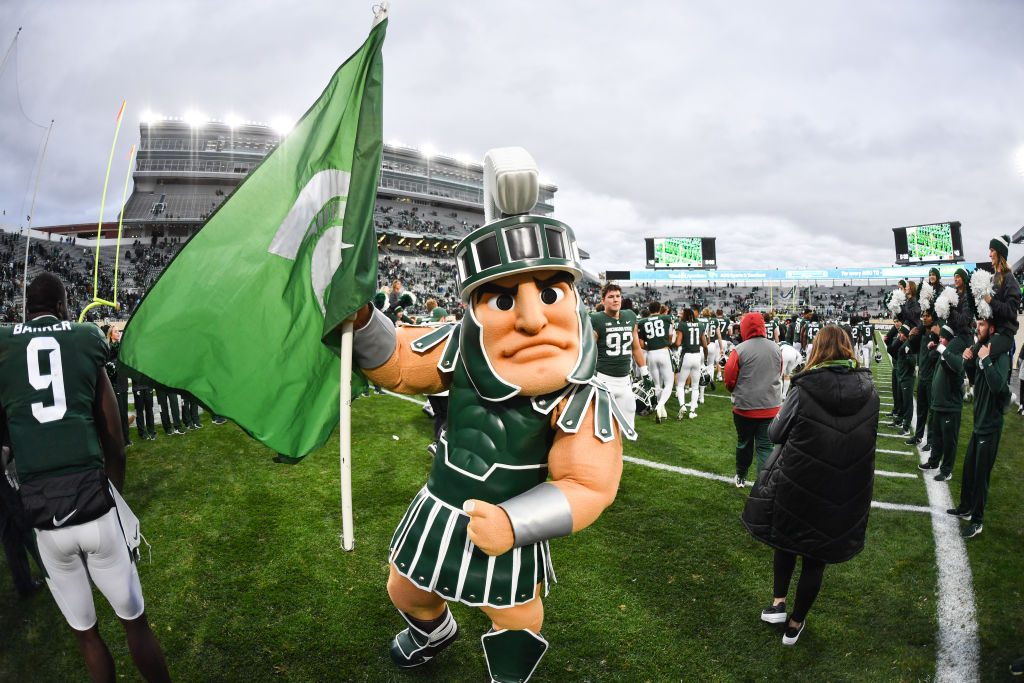
That’s going to buy one hell of a roster in East Lansing!
The arms race in college football continues to heat up.
With the relatively new advent of paying players now considered above board, athletic departments are falling all over themselves to secure funding to help maintain a competitive roster in a Power 4 conference.
You’ve been seeing more and more “non-traditional powers” throwing their hats in the ring to try and fund their way to national relevance, most famously out in Lubbock, where the Texas Tech Red Raiders are on the precipice of a Big 12 championship and a College Football Playoff berth.
Our latest participant in the college football arms race hails from East Lansing, Michigan.
The Spartans of Michigan State are trying their damnedest to get back to where they were in the early to mid 2010s, when head coach Mark Dantonio had the team competing for the Big Ten title year in and year out.
And one of the school’s mega boosters may have just dropped the biggest bomb in the war yet.
Yes, you read that right, some generous fellow donated more than $400 MILLION to the athletic department at Michigan State.
Greg Williams, a Michigan State booster and CEO of Acrisure, along with his wife, Dawn, gifted their hundreds of millions earlier on Friday through the university’s “Uncommon Will, Far Better World” campaign.
Now, to be sure, not all of this money will be going to the football program.
It’s earmarked for the athletic department at MSU, which involves all of their sports programs as well as facilities upgrades. But make no mistake about it, you can rest assured the bulk of this money will go towards funding the NIL apparatus for the Spartans’ football team.
Seeing how the football program at any Power 4 institution is more than likely the clear breadwinner, this would make sense.
Naturally, there were plenty of nerds on X who took exception to this donation and its intended purpose.
Cry me a river!
Trust me, if the football team at a Big Ten or SEC school is rolling, everyone at the university eats.
Just look at how much Alabama has grown since its football program took off after Nick Saban’s arrival.
In the meantime, if you start seeing Michigan State randomly signing top-five recruiting classes and bringing in a bunch of five-stars in the transfer portal, you’ll know why.
NIL
How historic $401 million donation to Michigan State helps Tom Izzo, Pat Fitzgerald
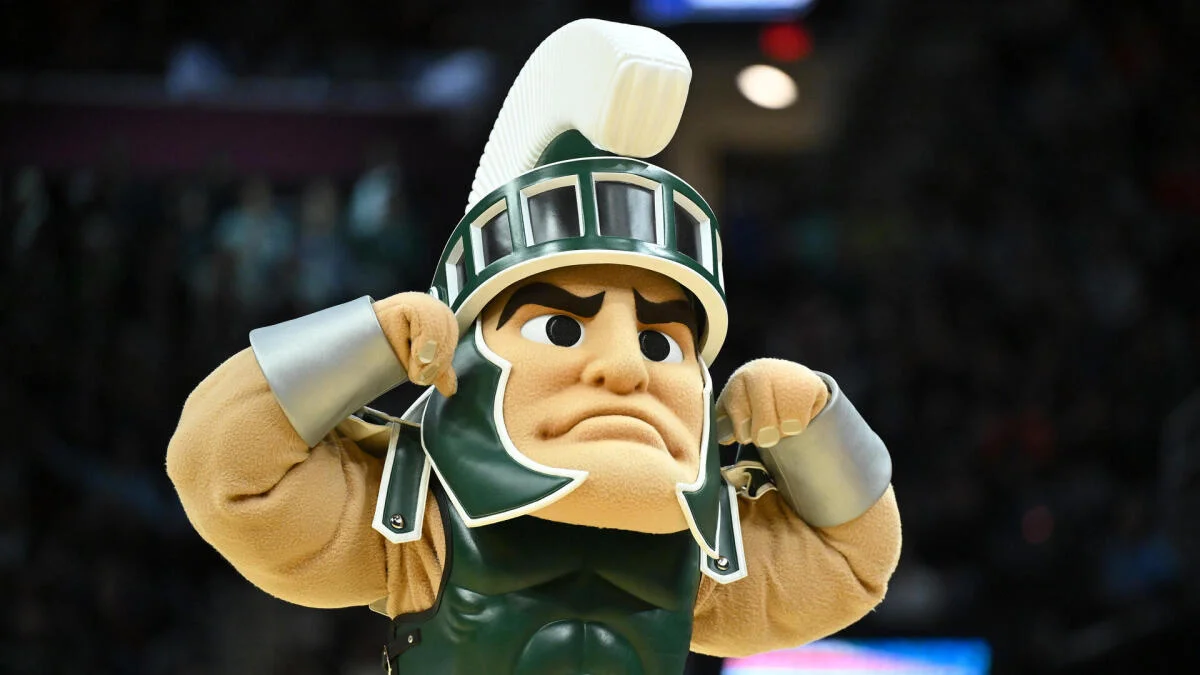
Michigan State is the latest school to receive a massive donation to its athletic department. Acrisure co-founder Greg Williams and his wife, Dawn, made a $401 million commitment with $290 million of that sum designated for MSU Athletics, the university announced Friday. It is the largest gift in school history and sets the Spartans up to be competitive in the revenue-sharing era of college sports.
The donation pushes Michigan State closer to the $1 billion goal associated with its athletics fundraising campaign. In an age where athletes can earn money directly from their school, financial support is as important as ever.
The cash influx also comes at a pivotal time for Michigan State, which just completed a football coaching change and seeks to reestablish itself as a Big Ten contender under Pat Fitzgerald. And while Tom Izzo said this spring that he has no plans to step away from the basketball court in the near future, the donation could help his eventual successor usher in a more modern recruiting approach.
Michigan State hires Pat Fitzgerald: Spartans act quickly for next coach after firing Jonathan Smith
Will Backus

“In today’s evolving college athletics landscape, this is a monumental day in the history of Michigan State Athletics,” Michigan State athletic director J Batt said. “Greg and Dawn’s commitment will provide the resources required for new levels of competitive excellence and student-athlete opportunities. We’re eternally grateful for their incredible generosity, dynamic leadership and trust.”
With the increased importance of athletic investment in the revenue-sharing era has come with a wave of historically large donations at numerous prominent universities. Kansas received a $300 million gift in August to fund its football stadium project and athletic programs, and Illinois secured a $100 million donation in September. Both are believed to be among the largest gifts ever given to college athletic departments.
A running start on roster construction for Pat Fitzgerald?
Michigan State’s football recruiting efforts took a dive during the two-year Jonathan Smith era but could rebound as a result of the coaching change and financial commitment. If the Spartans become more prominent players in the NIL and revenue-sharing world, Fitzgerald could attract more blue-chip talent to East Lansing than his predecessor, who never signed a class better than No. 42 in the 247Sports team recruiting rankings.
The Spartans this year posted their fourth consecutive losing record, marking the program’s worst stretch since 1979-83. The Big Ten is more competitive at the top now in the wake of conference expansion, and if Fitzgerald is to launch Michigan State into the league’s most elite tier, it will take work to climb out of the hole the Spartans dug to start the decade. Investment into the program should help in that regard.
Basketball program set for success in eventual post-Izzo era
Izzo, now 70 and in his 30th season on the job, is unabashedly committed to his principles, and while he says he is not opposed to change, his stances on the transfer portal and NIL are more conservative than some of his counterparts across college basketball. The more traditional approach works for Izzo, who won the Big Ten last year and appears this season to be poised for another run at the conference title and perhaps a Final Four.
Not everyone can win the way Izzo does, though. The Spartans have taken just seven transfers since 2019 and no more than three in a single cycle. Whenever he retires — and that day may not come for some time — his eventual successor will likely have to adopt a more modern recruiting strategy. That requires money, and lots of it. NIL and revenue-sharing budgets this season exceeded $10 million in the most extreme cases.
The Williams’ donation ensures that Michigan State basketball can spend with the richest programs in the country — if it wants to. That is a major win for Izzo’s successor, and perhaps Izzo will continue to adapt to the modern landscape and put the money to good use himself.
-

 Rec Sports2 weeks ago
Rec Sports2 weeks agoFirst Tee Winter Registration is open
-

 Rec Sports1 week ago
Rec Sports1 week agoFargo girl, 13, dies after collapsing during school basketball game – Grand Forks Herald
-

 Motorsports2 weeks ago
Motorsports2 weeks agoCPG Brands Like Allegra Are Betting on F1 for the First Time
-
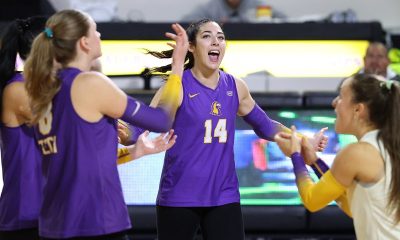
 Sports2 weeks ago
Sports2 weeks agoVolleyball Recaps – November 18
-

 Motorsports2 weeks ago
Motorsports2 weeks agoF1 Las Vegas: Verstappen win, Norris and Piastri DQ tighten 2025 title fight
-

 Sports1 week ago
Sports1 week agoTwo Pro Volleyball Leagues Serve Up Plans for Minnesota Teams
-

 Sports1 week ago
Sports1 week agoUtah State Announces 2025-26 Indoor Track & Field Schedule
-

 Sports1 week ago
Sports1 week agoSycamores unveil 2026 track and field schedule
-

 Sports1 week ago
Sports1 week agoTexas volleyball vs Kentucky game score: Live SEC tournament updates
-

 NIL5 days ago
NIL5 days agoBowl Projections: ESPN predicts 12-team College Football Playoff bracket, full bowl slate after Week 14























































